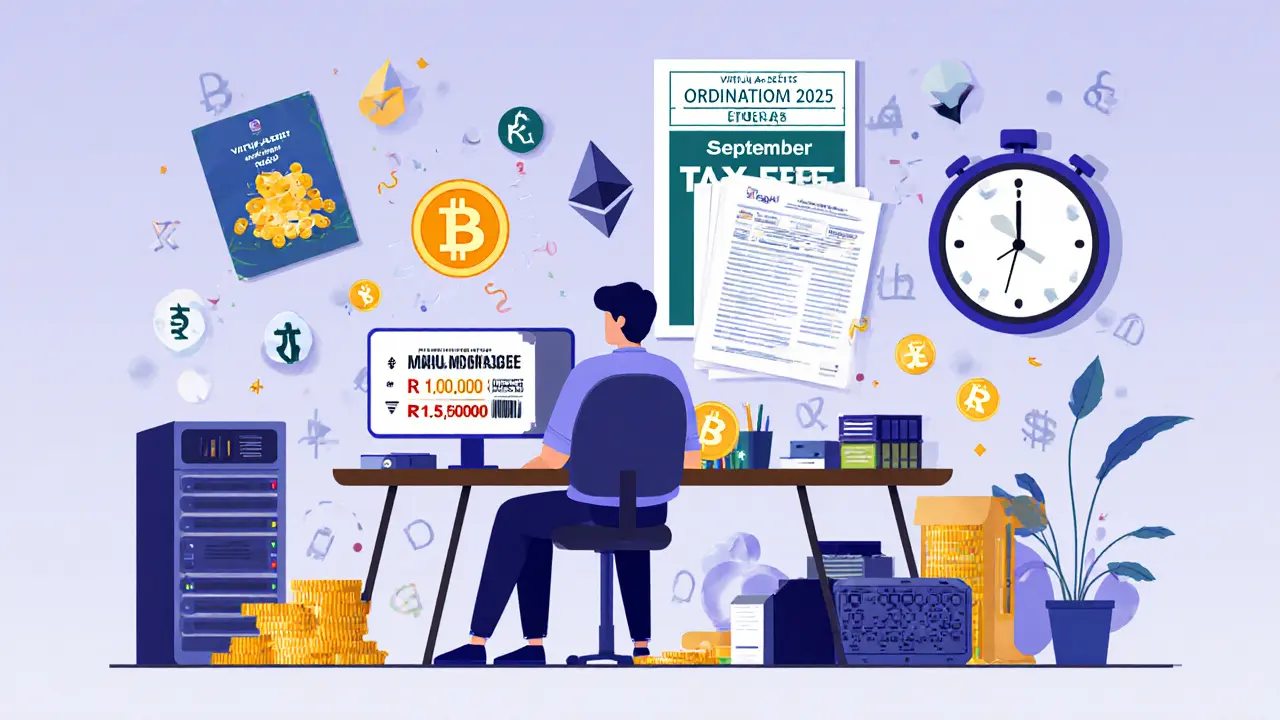
Pakistan Crypto Tax Calculator
Calculate Your Tax Liability
Profit:
Tax (15%):
Net Proceeds:
Important: Profits under ₨50,000 are exempt from capital gains tax. This calculator shows the tax for amounts above this threshold.
There’s a rumor floating around that Pakistan is cutting its crypto capital gains tax from 15% to 0%. If you’ve heard this, you’re not alone. Social media posts, Telegram groups, and even some YouTube videos are claiming the government is going all-in on crypto by eliminating taxes entirely. But here’s the truth: Pakistan’s 15% capital gains tax on cryptocurrency profits is still in effect, and there’s no official plan to drop it to zero.
Where Did the 0% Tax Myth Come From?
The idea that Pakistan is moving to a 0% crypto tax sounds appealing - and that’s exactly why it spreads. People want to believe their country is becoming a crypto haven like Dubai or Portugal. But this claim doesn’t come from any government document, Finance Ministry announcement, or Federal Board of Revenue (FBR) notice. It’s a mix of wishful thinking and misinterpretation.
Some confuse Pakistan’s new regulatory clarity with tax relief. In 2025, Pakistan finally moved from blocking crypto to regulating it. The Virtual Assets Ordinance, passed in July 2025, gave legal standing to digital assets for the first time. That meant exchanges could operate legally, users could report gains without fear of prosecution, and the government could start collecting taxes. But legal recognition ≠ tax exemption.
Meanwhile, countries like Portugal (which scrapped crypto taxes in 2024) and El Salvador (where Bitcoin is legal tender) are often cited as examples. People see those names and assume Pakistan is following suit. It’s not. Pakistan chose a middle path: a flat 15% tax on profits, not zero.
How Pakistan’s Crypto Tax Actually Works
Under the current rules, if you buy Bitcoin at ₨2 million and sell it later for ₨3 million, you owe 15% on the ₨1 million profit. That’s ₨150,000 in tax. It doesn’t matter if you held it for 10 days or 10 years - the rate stays the same.
Here’s what else is taxed:
- Staking rewards: Treated as income. Taxed at your personal income tax rate - up to 35% if you earn over ₨12 million annually.
- Crypto mining: Also taxed as income. No special rate, but no ban either.
- Receiving crypto as payment: If you’re paid in Ethereum for freelance work, that’s taxable income in PKR based on the market rate at the time of receipt.
- Businesses: Crypto-related businesses pay 29% corporate tax.
There’s one small relief: transactions under ₨50,000 profit are exempt. But that’s not much help for most traders. If you’re buying and selling regularly, you’ll likely hit that threshold fast.
Why Not 0%? The Real Reason Behind the 15%
Pakistan didn’t pick 15% out of thin air. It was a compromise. The International Monetary Fund (IMF) pushed for formal taxation to plug revenue leaks. At the same time, local crypto advocates argued that a high rate would drive users offshore. The 15% rate was chosen to be high enough to generate revenue, but low enough to keep traders in the country.
Compare it to other countries:
- India: 30% flat tax + 1% TDS on every trade
- United States: 0% to 20% depending on income and holding period
- Dubai: 0% for individuals
- Thailand: 15% flat - same as Pakistan
Pakistan’s rate sits right between strict and lenient. It’s not the friendliest, but it’s not the harshest either. For many, it’s better than the 30% tax rumors that circulated in 2024.

What About Long-Term Holders? No Breaks Yet
One of the biggest complaints from crypto investors is the lack of a holding period discount. In Germany, if you hold crypto for over a year, you pay nothing. In the U.S., long-term gains get lower rates. But in Pakistan, holding for five years doesn’t change your tax bill.
That’s a problem for people who want to build wealth, not flip coins. Blockchain expert Fahad Shahbaz pointed out in a March 2025 interview that this discourages institutional investors - the kind who bring real capital and long-term stability.
There’s hope, though. In October 2025, the Pakistan Digital Assets Authority (PDAA) announced draft regulations exploring “long-term holding incentives.” No details yet. No timeline. But the fact they’re even talking about it means change could be coming - just not in 2025.
Compliance Is a Nightmare - And That’s the Real Issue
Even if the tax rate were 0%, most users wouldn’t know how to report their gains. The FBR hasn’t released a simple crypto tax form. No official calculator. No standardized way to track cost basis for coins bought before 2025.
Users are forced to:
- Export transaction history from Binance, Bybit, or local exchanges like Rain
- Convert every trade to PKR using historical exchange rates
- Manually calculate profits across dozens of wallets and platforms
- Submit everything by September 30 using Form IT-1 - a form designed for stocks, not crypto
On average, a Pakistani crypto user spends 15 to 20 hours a year just on tax paperwork. That’s more time than most people spend filing their salary taxes.
That’s why tools like Koinly and CoinTracker are booming in Pakistan. Over 28,000 Pakistani users have signed up for them since July 2025. They auto-import trades, calculate gains, and generate PDFs for the FBR. But they’re not free - and they’re not perfect. Many users still struggle with DeFi yields, airdrops, and cross-chain swaps.

What’s Really Happening in Pakistan’s Crypto Market
Despite the tax, crypto adoption is growing. By September 2025, an estimated 12.7 million Pakistanis owned crypto - over 5% of the population. Trading volume jumped 217% year-over-year. The market is now worth $3.2 billion, or 0.8% of the national economy.
Foreign investors are taking notice. In August 2025, the Special Investment Facilitation Council granted Pakistan’s first high-performance data center license for Bitcoin mining - 2,000 megawatts of dedicated power. That’s not the move of a country trying to kill crypto. It’s the move of one trying to harness it.
Revenue projections are modest but real. PwC estimates Pakistan will collect ₨28.5 billion ($102 million) in crypto taxes by June 2026. That’s less than 0.1% of total tax revenue - but it’s a start.
What to Do Now
If you’re a crypto user in Pakistan:
- Don’t believe the 0% tax rumors. They’re false.
- Start tracking every transaction - even small ones.
- Use a crypto tax tool like Koinly or CoinTracker. It saves time and reduces errors.
- Save all receipts, screenshots, and exchange statements. The FBR may ask for them.
- Watch for updates from the PDAA. A tiered tax system (lower rates for long-term holds) could arrive in 2026.
There’s no magic fix. But there’s a path forward. The government isn’t trying to punish crypto. It’s trying to bring it into the system. That’s progress - even if it’s messy.
Is crypto tax really 15% in Pakistan in 2025?
Yes. Pakistan applies a flat 15% Capital Gains Tax on profits from selling cryptocurrency for fiat currency. This rate has been in effect since July 2025 under the Virtual Assets Ordinance. There is no official 0% tax rate.
Are there any crypto tax exemptions in Pakistan?
Yes. Profits under ₨50,000 from crypto sales are exempt from Capital Gains Tax. However, income from mining, staking, or payments received in crypto is taxed as regular income, with no exemption threshold.
Do I pay tax if I trade crypto for another crypto?
Yes. Trading one cryptocurrency for another (e.g., BTC for ETH) is considered a taxable event in Pakistan. You must calculate the profit in PKR based on the value of the asset sold at the time of trade.
What happens if I don’t report my crypto gains?
The Federal Board of Revenue (FBR) began receiving transaction data from exchanges in mid-2025. Failure to report can lead to penalties, interest charges, or audits. While enforcement is still ramping up, non-compliance is becoming riskier.
Will Pakistan lower crypto tax to 0% in the future?
There is no official plan to eliminate crypto taxes. However, the Pakistan Digital Assets Authority has signaled it may introduce tiered rates by 2026 - possibly reducing taxes for assets held over one or two years. A 0% rate is not currently under discussion.
Ali Korkor
28 10 25 / 08:34 AMYo if you're holding crypto in Pakistan, just use Koinly. Seriously. It saved me hours last tax season. No drama, just import, click, done. The FBR doesn't care how you do it as long as the numbers are right.
Ayanda Ndoni
29 10 25 / 22:56 PMBro why are we even talking about taxes? The real issue is nobody can actually track their DeFi yields. I tried to file last year and ended up crying in a McDonald's parking lot. The system is broken, not the tax rate.
Elliott Algarin
30 10 25 / 22:39 PMIt's interesting how we treat crypto like it's this revolutionary force, but then we still try to jam it into old tax frameworks. Maybe the problem isn't the 15%-it's that we're trying to tax something that doesn't fit neatly into century-old accounting rules. The system needs rethinking, not just tweaking.
John Murphy
31 10 25 / 05:11 AMI'm just glad they didn't go full India with the 30% and TDS. That would've killed adoption overnight. The 15% is rough but manageable. I wish they'd make the reporting easier though.
Akinyemi Akindele Winner
31 10 25 / 11:57 AM15%? That's nothing. In Lagos we pay 20% in informal taxes just to keep our Binance account alive. At least Pakistan has a legal framework. Half the African exchanges are just ghost ops with WhatsApp support. You call it a tax, I call it survival.
Patrick De Leon
1 11 25 / 03:10 AMPakistan’s 15% is actually quite progressive compared to Ireland’s 33% on crypto gains. We treat it as capital gains here. You’re lucky to have a flat rate. Stop complaining and start reporting. The FBR isn’t your enemy-it’s your future accountant.
MANGESH NEEL
1 11 25 / 18:35 PMLet me break this down for you peasants who think this is a "fair" system. The FBR is using crypto tax as a cash grab while ignoring the fact that 80% of users are under 25 and barely earn 10k PKR/month. They’re taxing dreams while the rich hide their wealth in real estate and offshore trusts. This isn’t regulation-it’s class warfare dressed up as fiscal policy. And don’t even get me started on the "exemption" of 50k profit-that’s like saying "you can steal a loaf of bread but not a whole carton".
Roxanne Maxwell
2 11 25 / 04:41 AMI lived in Lahore for a year and met so many young people trading crypto to send money home. The tax isn’t the issue-it’s the lack of trust in the system. If the FBR made a simple app, people would file willingly. But right now? It feels like asking someone to do their taxes in Latin.
Jonathan Tanguay
2 11 25 / 07:32 AMWow you guys are so naive. The 15% is just the tip of the iceberg. Did you know that every time you trade BTC for ETH, you’re triggering a taxable event? And most people don’t even know that. I’ve seen traders lose 40% of their gains because they didn’t track cost basis properly. The FBR is watching. They’ve got API access to Binance and Bybit. You think you’re anonymous? You’re not. You’re just bad at math. And if you think a 50k exemption helps? That’s like saying "you can be poor without being taxed". Wake up. This isn’t a game. This is your financial life.
Sean Huang
3 11 25 / 11:17 AMThey're not taxing crypto they're taxing hope. The 0% rumor? That was a psyop. The IMF wrote the script, the FBR is the actor, and we're the audience cheering for a free lunch that doesn't exist. The real plan? Normalize crypto so they can surveil every wallet. Then they'll add crypto to the wealth tax. Next year they'll say "you owe 5% on your total holdings". This isn't regulation. This is the slow strangulation of financial freedom with paperwork.
madhu belavadi
4 11 25 / 01:40 AMWho even cares? I just hold. I don't trade. I don't care about taxes. I just want my BTC to go to the moon. Why are we arguing about this?
Dick Lane
4 11 25 / 21:36 PMThey’re not going to drop it to 0% but they might add a long-term discount. I heard PDAA is testing a model where holding over 2 years cuts the rate to 7%. Not official yet. But if you’re a holder, start documenting your buys now. Paper trail matters more than rumors.
Zach Crandall
6 11 25 / 12:54 PMActually, the most dangerous part isn't the tax-it's the lack of legal clarity on airdrops and forks. I got 0.3 ETH from a hard fork last year and the FBR sent me a letter asking for proof it wasn't income. I had to hire a lawyer. No one told me this would happen. The rules are written in invisible ink.